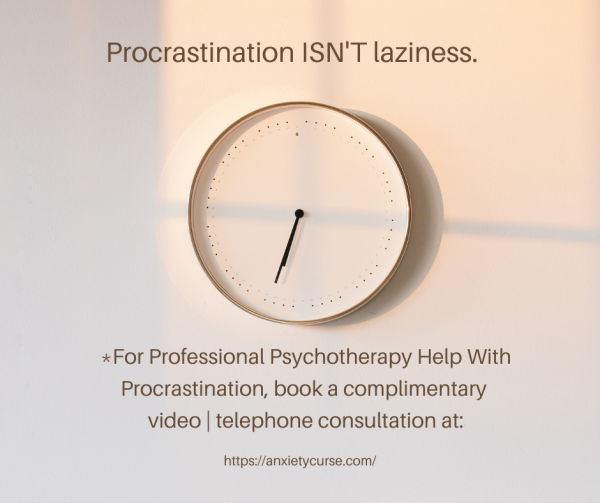
Today, I was inspired to write about procrastination by a long-term, young client of mine.
We’ve been working together for the past 2 years (on and off), as he struggles with Social Anxiety and Low Mood.
A big symptom of both is procrastination, or a ‘lack of motivation’ to do things he should be doing.
We’ve actually had quite a bit of a break, as he was stable and doing well at university. But procrastination was always something he struggled with- yet today, for the first time, he was able to laugh about it (as opposed to beating himself up about it before).
 Finally, some sort of acceptance that ‘this is me’ was in place. Yes, he procrastinates but it DOES NOT NEGATIVELY AFFECT HIM OR HIS WORK, apart from severe self-criticism in the past.
Finally, some sort of acceptance that ‘this is me’ was in place. Yes, he procrastinates but it DOES NOT NEGATIVELY AFFECT HIM OR HIS WORK, apart from severe self-criticism in the past.
But if the procrastination IS affecting you, your life and your work negatively, you should work on it
(please contact me using the booking form below if you struggle with procrastination).
So let’s take a look at procrastination in detail:
First of all, people mistake procrastination for “laziness”. They talk about it as if it was some nasty character flaw. But procrastination has nothing to do with being ‘lazy’, especially if it’s caused by anxiety and/or low mood.
People will often use definitions like, “putting off”, “postponing”, “delaying”, “deferring”, “leaving to the last minute” – all of which are valid.
We could say that procrastination is:
“Making a decision for no valid reason to delay or not complete a task or goal you’ve committed too, and instead doing something of lesser importance, despite there being negative consequences to not following through on the original task or goal.”
*Do you need help with Procrastination? Book a Complimentary Phone Consultation:
6-Step Procrastination Action Plan:
It can be helpful for you to draw up a clear plan of action for what it is you need to do when the urge to procrastinate arises.
Study the following 6 steps of my action plan to get on top of your procrastination, any time you feel it is negatively affecting your work and personal life:
Step 1. Be Aware & Non-Blaming.
The first step is to stop and recognize your urge to procrastinate.
When you do recognize that you are procrastinating or you are having the urge to procrastinate, do so in a non-judgmental and non-blaming way.
Don’t beat yourself up for it, but instead recognize that procrastination has arrived and that you are going to make a choice to do things differently.
Step 2. Adjust Unhelpful Rules & Assumptions
If you can recognize the unhelpful rule or assumption that is being activated by your task or goal, you can make attempts to adjust this.
You can do this by challenging the rule or assumption, questioning where it came from, and identifying its negative consequences.
For example:
Fact:
I am really tired
Rule or Assumption:
I am better off doing it after I have rested
Now, think of a new more helpful rule or assumption, and what you would need to do to put it into practice in this situation.
For example:
Fact:
I am really tired
More helpful rule or assumption:
But I can still make a small start right now.
Watch my FREE *Procrastination Workshop*:
Step 3. Practice Tolerating Discomfort
If you can recognize the discomfort (or ‘hate’) that is arising within you about doing the task or goal, you can practice tolerating it mindfully by just being aware and observing or watching the discomfort without judgement, making space for it and letting it go when its ready.
You could imagine riding the wave of your discomfort or delaying procrastination to give yourself time to practice sitting with the discomfort.
Step 4. Dismiss Procrastination Excuses & Encourage
Look for the excuses you are making to justify your procrastination. Notice your old unhelpful conclusions, such as not needing to do the task now because of something or the other.
Is you conclusion (excuse) really true? What is the evidence or a reason?
Am I really going to be better off?
Is it really true I can’t get started?
What will the consequences be?
Also, is there a way to test if your conclusion is true, rather than assuming it is?
And finally, settle on a conclusion that is more helpful to you, something more along the line that you can make some small start now!
Drop any self-criticism and instead talk to yourself as if you were motivating and encouraging a friend.
Step 5. Carry Out Practical Strategies
Decide on the practical strategies most relevant to the task or goal at hand and apply these practical strategies.
Remember, to gain clarity as to exactly what needs to be done, write a list of tasks and goals, then prioritize these.
Next, grade them from the easiest to hardest, and then accurately estimate how much time each step of each task or goal will take.
There are many ways you can approach any given step of a task, such as:
Worst-first;
Using momentum;
Just 5- minutes;
Set time limits;
Prime time, prime place;
Remember-then-do;
Reminders, visualise, focus;
Plan rewards.
Step 6. Reflect & Revise Plan
Now, step back and reflect on how you are doing.
Examine how things are going.
Appreciate what is working well and the positive consequences of doing rather than procrastinating.
Also, identify areas may need some improvement.
If something does need to be revised, revisit steps 1-5, and try again.
*Please note that from your action plan, it is steps 4 & 5 that are most important to focus on, in order to see some change in your procrastination habit.
Final word:
Keep Going!
Expect that changing your procrastination habit will take time, practice, persistence and patience.
Expect that you will have good days and bad.
Expect you will have days you feel like a ‘doer’, and days you feel like you have slipped back into ‘procrastinationville’.
The old saying of “two steps forward, one step back” is very true.
If you expect setbacks when you sign up for the journey of changing your procrastination, then when you face a bump in the road, you will be less likely to blame yourself and give up.
*Do you need help with Procrastination? Book a Complimentary Phone Consultation:
Share This Article With Friends & Family
Further articles you may like:
1606, 2023
708, 2022
1707, 2022
Anxiety And Procrastination At Work
Can Anxiety cause Procrastination? Absolutely. Anxiety and Low Mood can both result in Procrastination at work. In this article, I'm going to take a closer look at what Procrastination is, and how to help yourself if you struggle with Anxiety AND procrastination. Let's start with Procrastination: First of all, people mistake procrastination
2606, 2022
405, 2022
Assertiveness Mastery: 9 Effective Steps to Improve Assertiveness Skills and Boost Self-Confidence
In today's fast-paced world, mastering assertiveness skills has become an essential tool for personal and professional growth. It's not just about being confident; it's about communicating your needs and respecting others in a balanced and healthy way. I've recently launched a new book, 'Building Assertive Mindset: A Guide to
1204, 2022
 Finally, some sort of acceptance that ‘this is me’ was in place. Yes, he procrastinates but it DOES NOT NEGATIVELY AFFECT HIM OR HIS WORK, apart from severe self-criticism in the past.
Finally, some sort of acceptance that ‘this is me’ was in place. Yes, he procrastinates but it DOES NOT NEGATIVELY AFFECT HIM OR HIS WORK, apart from severe self-criticism in the past.


